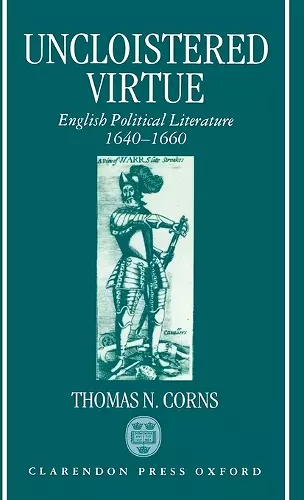Uncloistered Virtue
English Political Literature, 1640-1660
Format:Hardback
Publisher:Oxford University Press
Published:9th Jul '92
Currently unavailable, and unfortunately no date known when it will be back

Uncloistered Virtue studies the relationship between literature and the political crises of the English Civil War. It explores the ways in which the literary culture of the period changed and survived in radically shifting circumstances and conditions of sometimes extreme adversity, and examines the ways in which old forms developed and new forms emerged to articulate new ideologies and to respond to triumphs and disasters. Included in the book's discussion of a very wide range of authors and texts are examinations of the Cavalier love poetry of Herrick and Lovelace, Herrick's religious verse, the polemical strategies of Eikon Basilike, and the complexities of Cowley's political verse. The author also provides an important new account of Marvell's political instability, while the prose of Lilburne, Winstanley, and the Ranters is the subject of a long and sustained account which focuses on their sometimes exhilarating attempts to find an idiom for ideologies which previously had been unexpressed in English political life. Through the whole study runs a detailed engagement with Milton's political prose, and the book ends with a consideration of the impact of the Civil War and related events on the English literary tradition, specifically on Rochester, Bunyan, and the later writing of Milton.
`As a reviewer, I am hard-pressed to find even a quibble with this book. The great merit of Uncloistered Virtue: English Political Literature 1640-1660 lies in its careful, painstaking contextualization of the literature of the interregnum year by year and even month by month ... He captures a delicate, complicated interaction between politics, history and literary invention that cannot be reduced to fit a simple ideological model. Professor Corns's prose is clear and elegant, even elegiac in the final chapters. He has made a major contribution to seventeenth-century studies, to Milton studies and to new historicism.' Frank Cass Journals, Vol 16, No 2 (Aug 1993)
`a tautly-written book which consistently illuminates ... His real achievement ... is to make clear, in a series of strenuous yet patient analyses, the literary artifice which guarantees the power of Milton's polemical writing ... a ground-breaking study which is an important contribution to historiography as well as to Milton scholarship.' A Journal of English Language and Literature
`most impressive achievement ...the first attempt at a comprehensive literary study of 1640-1660 ...The virtues of the book are in its careful contextual reading of works long valued in the literary canon, together with a generally approving assessment of radical literature ... as rich and important writing ...Corns is unpretentiously conservative in method, and warmly sympathetic in spirit to the predicaments of his subjects' Nigel Smith, The Times Literary Supplement
`Thomas Corns has written a better history book than he seems to realise ... In fact this is a first-rate history book ... a first-rate piece of literary criticism ... a first-rate collection of essays ... it is written with precision and elegance. It deserves a wide audience. John Morrill
'a highly selective examination of English poetry and prose of the mid-17th century ... Students of the period will discover valuable and useful critical insights.' S. Archer, Texas A & M University, Choice, Mar '93
'...his accounts of Lovelace and Herrick are rich and detailed, and offer a convincing analysis of how their erotic poetry is bound up with their royalist politics: ... Dr Corns is a good close reader with a sharp eye for significant detail, and some major questions are brought helpfully, ... into focus. The several accounts of Milton porvide a thoughtful reading of Milton's rhetoric of argument, ... Dr Corns is astute in analysing how Milton deploys his evidence and authorities," The Seventeenth Century. Vol. IX No. 1. Spring 1994
' ... this exceptionally fine book offers new perceptions and strikingly illuminating comments on nearly every page. Its very considerable achievement is to make us realize how little we have appreciated the diversity and richness of the cultural history of these so much studied years. This achievement does not lie in address to neglected texts ... it lies rather in the sensitivity and persuasiveness with which Dr Corns repoliticizes familiar texts, ... its scope is far more comprehensive than that of any other study. Dr Corns is an attentive, sensitive, and careful reader, There are some fine, crisp judgements: This is historiicizing at its best, preferring the scholarly and critical accuracy of historical and textual particularities to the clarion call of large generalizations.' N.H.Keeble, University of Stirling. Notes and Queries June '94
'Corns succeeds in his programme of reanimation by combining effectively a critic's trained eye for textual detail with a good historian's seemingly effortless narrative mastery of great masses of names, events, motivations, and social and political interconnections.' Archiv
this is a sharp and most valuable addition to writing about mid-seventeenth-century literature. * Modern Language Review *
Corns works with an ideal of balance, and, unlike numerous recent works in thes field, a liberal eschewing of theoretical and ahistorical political commitment. This is a good, useful, traditional book. thehistorical contextualizings are aduqate, the close readings excellent. * English Studies Review *
fascinating, wide ranging, richly detailed, and superbly sensitive account of the literature of the English Revolution ... This is a fine book. * Nick Groom, University of Exeter, Bunyan Studies, no 8, 1998 *
ISBN: 9780198128830
Dimensions: 225mm x 145mm x 24mm
Weight: 560g
352 pages